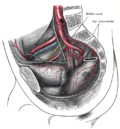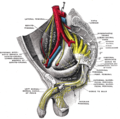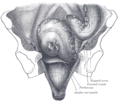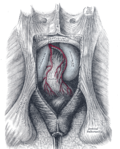Levator ani
Levator ani is a broad, thin muscle, situated on the side of the pelvis. It is formed from three muscle components: the puborectalis, the pubococcygeus muscle and the iliococcygeus muscle. It is part of the larger group of muscles, known as the pelvic floor, which supports the pelvic organs and spans the bottom of the pelvis.
Structure[edit]
The levator ani is a broad, thin muscle inside the pelvis, inferior to the pelvic diaphragm. It forms the main part of the pelvic floor and supports the pelvic viscera. The levator ani is divided into three parts: the puborectalis, the pubococcygeus, and the iliococcygeus. The puborectalis is the most medial part of the muscle and forms a sling around the rectum. The pubococcygeus is the middle part of the levator ani, and the iliococcygeus is the most lateral part of the muscle.
Function[edit]
The levator ani muscles are essential for providing support to the pelvic organs, including the bladder, intestines, and uterus in females. They also play a crucial role in maintaining continence, as they can contract to increase the pressure within the abdomen and prevent the passage of feces and urine.
Clinical significance[edit]
Damage to the levator ani muscle can occur during childbirth, leading to pelvic organ prolapse or urinary and fecal incontinence. Treatment for damage to the levator ani muscle includes physical therapy to strengthen the muscles and surgery to repair the damaged muscle.
See also[edit]
- Pelvic floor
- Puborectalis muscle
- Pubococcygeus muscle
- Iliococcygeus muscle
- Pelvic organ prolapse
- Urinary incontinence
- Fecal incontinence
|
|
|
Levator_ani[edit]
-
3D Medical Animation of Levator Ani structure
-
Muscles of the pelvis
-
Muscles of the male perineum
-
Muscle of the Male Perineum
-
Levator ani
-
Muscles of the female perineum
-
Muscles of the pelvic floor
-
Muscles of the pelvic diaphragm
-
Muscles of the pelvic diaphragm, side view
-
Muscles of the pelvic diaphragm, inferior view
-
Diagram of the human anus
Ad. Transform your life with W8MD's Budget GLP-1 injections from $49.99


W8MD offers a medical weight loss program to lose weight in Philadelphia. Our physician-supervised medical weight loss provides:
- Weight loss injections in NYC (generic and brand names):
- Zepbound / Mounjaro, Wegovy / Ozempic, Saxenda
- Most insurances accepted or discounted self-pay rates. We will obtain insurance prior authorizations if needed.
- Generic GLP1 weight loss injections from $49.99 for the starting dose of Semaglutide and $65.00 for Tirzepatide.
- Also offer prescription weight loss medications including Phentermine, Qsymia, Diethylpropion, Contrave etc.
NYC weight loss doctor appointmentsNYC weight loss doctor appointments
Start your NYC weight loss journey today at our NYC medical weight loss and Philadelphia medical weight loss clinics.
- Call 718-946-5500 to lose weight in NYC or for medical weight loss in Philadelphia 215-676-2334.
- Tags:NYC medical weight loss, Philadelphia lose weight Zepbound NYC, Budget GLP1 weight loss injections, Wegovy Philadelphia, Wegovy NYC, Philadelphia medical weight loss, Brookly weight loss and Wegovy NYC
|
WikiMD's Wellness Encyclopedia |
| Let Food Be Thy Medicine Medicine Thy Food - Hippocrates |
Medical Disclaimer: WikiMD is not a substitute for professional medical advice. The information on WikiMD is provided as an information resource only, may be incorrect, outdated or misleading, and is not to be used or relied on for any diagnostic or treatment purposes. Please consult your health care provider before making any healthcare decisions or for guidance about a specific medical condition. WikiMD expressly disclaims responsibility, and shall have no liability, for any damages, loss, injury, or liability whatsoever suffered as a result of your reliance on the information contained in this site. By visiting this site you agree to the foregoing terms and conditions, which may from time to time be changed or supplemented by WikiMD. If you do not agree to the foregoing terms and conditions, you should not enter or use this site. See full disclaimer.
Credits:Most images are courtesy of Wikimedia commons, and templates, categories Wikipedia, licensed under CC BY SA or similar.
Translate this page: - East Asian
中文,
日本,
한국어,
South Asian
हिन्दी,
தமிழ்,
తెలుగు,
Urdu,
ಕನ್ನಡ,
Southeast Asian
Indonesian,
Vietnamese,
Thai,
မြန်မာဘာသာ,
বাংলা
European
español,
Deutsch,
français,
Greek,
português do Brasil,
polski,
română,
русский,
Nederlands,
norsk,
svenska,
suomi,
Italian
Middle Eastern & African
عربى,
Turkish,
Persian,
Hebrew,
Afrikaans,
isiZulu,
Kiswahili,
Other
Bulgarian,
Hungarian,
Czech,
Swedish,
മലയാളം,
मराठी,
ਪੰਜਾਬੀ,
ગુજરાતી,
Portuguese,
Ukrainian













